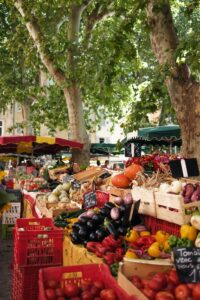Nom de l’entreprise familiale
Resilience of family businesses in times of crisis: creating a long-term vision

Bonduelle Group
Secteur professionnel et taille de l'entreprise
Agriculture, <50 employees
Besoin/problèmes/défis abordés
Succession, lack of experience or skills
Pays
France
Source
Lien vers plus d’informations
L’aliment à Floudès was started by two Italian immigrants to France, Antoine and Mireille De Biasi, in 1970. Antoine arrived with agricultural know-how, raising animals, growing tobacco and vines. In 1987, the couple’s son, Philippe joined the business, focusing on market produce and cereal production. The business continued to grow, above all, thanks to family members joining the family adventure. Philippe’s children, Simon and Pauline joined the family farm in 2016 and 2022 respectively. Pauline was a horse-riding coach and decided to join the business in order to better develop the farm’s direct sales to consumers.
Part of the reason the family works so well together is that they each have their roles and bring something to the table for the family farm. Marie-Pierre, Philippe’s wife, mostly handles administrative tasks, while their son, Simon works on cereal production and Pauline and Philippe work together mostly on the fruits and vegetables. In terms of experience and skills, which can sometimes be a challenge for family businesses, especially during moments of succession or the next generation joining the family adventure, the family bases itself first and foremost on familial know-how and tradition passed on to next generations. As the children picked up some of this know-how from their parents, the learning curve was that much simpler to face.
The familial agricultural know-how, which dates back to more traditional ways of growing, is well complemented by recent consumer trends like buying local and in-season. This trend not only arose from ecological and sustainability concerns by consumers but also increased conscientious buying during and after the Covid19 pandemic as well as price changes and inflation: “The buyer knows where their money is going and the quality of the products.” The De Biasi also sells at competitive and fair prices, with local fruit prices being very comparative to large supermarket chains. Their customers can buy directly on the farm or in local Farmer Drives every Friday. According to Pauline, the Drives have “have all the same products as a supermarket, aside from cleaning supplies, and they all come from local producers from the region.”
According to a 2016 Eurostat study, family farms are the most common types of farms in the EU. According to the UN’s Food and Agriculture Organisation (FAO), small family farms produce approximately one-third of the world’s food. The FAO also sees family farms as a major motor for local and regional development, and a “unique potential to move toward productive and sustainable food systems”. Thus the De Biasi familial and traditional agricultural practices may not just be a trend but part of the future of farming.
This does not discourage them from “innovating” in some ways, trying other products, adding new fruits to their repertoire, and testing new projects for the family business. According to Pauline: “Working as a family allows us to support each other in all of our projects. Even if we’re not going in the same direction, we all share the same destination.”


